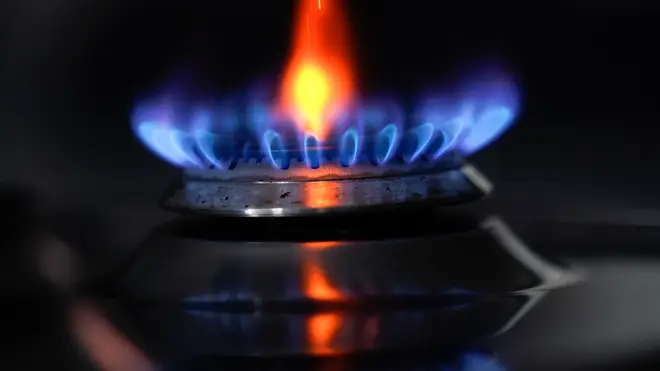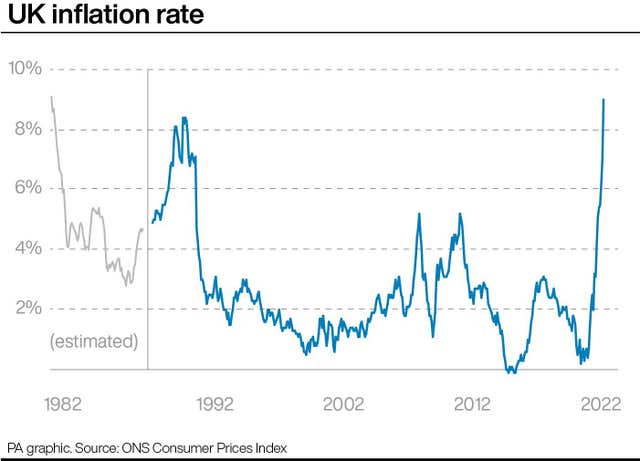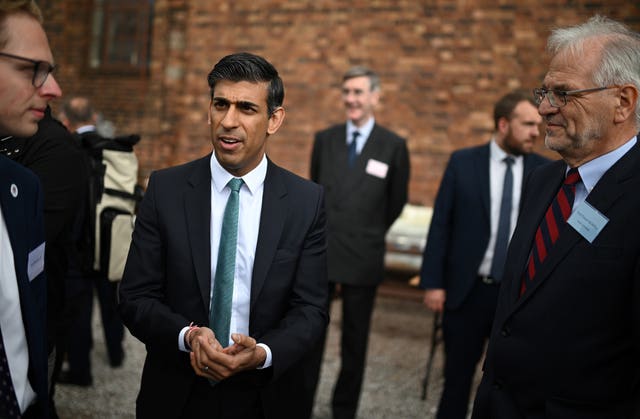
Daniel Barnett 9pm - 10pm
18 May 2022, 11:44

Labour called for more help for struggling households, but the Chancellor said it was not possible to totally protect people from rising costs
The cost of living in the UK has increased at its fastest rate for four decades as soaring energy bills put millions of households under pressure.
Consumer Prices Index inflation rose to 9% in the year to April, up from an already high 7% in March, the Office for National Statistics (ONS) said.
It was the fastest measured rate since records began in 1989, and the ONS estimates it was the highest since 1982.
A large portion of the rise was due to the price cap on energy bills, which was hiked by 54% for the average household at the start of the month.

Grant Fitzner, chief economist at the ONS, said: “Inflation rose steeply in April, driven by the sharp climb in electricity and gas prices as the higher price cap came into effect.
“Around three-quarters of the increase in the annual rate this month came from utility bills.
“We have also published new modelled historical estimates today which show that CPI annual inflation was last higher 40 years ago.”

The figures will add to pressure faced by households to cut back on bills and everyday spending.
Already ahead of the figures being released, surveys showed that people were switching to cheaper alternatives, and trying to control how much energy they use to run their homes.
Much of the jump is down to the high cost of energy on international markets, especially gas, although oil prices have also shot up.
This has also pushed up the price of many other items, including food, which are made or transported using gas and oil-based products. The war in Ukraine has also hit global food supplies.
The Consumer Prices Index including owner occupiers’ housing costs grew 7.8% in the year to April 2022.
This is up from the 6.2% growth in the year to March 2022 https://t.co/nLz4yAJDYK
— Office for National Statistics (ONS) (@ONS) May 18, 2022
Just getting around, including to work, has become more expensive for households too. Prices for both petrol and diesel are at record highs, although recently soaring prices for second-hand cars eased off slightly in April.
Meanwhile, restaurant prices are also increasing, rising 1.8% in just a month.
Chancellor Rishi Sunak said that inflation is hitting countries around the world, and pointed to energy prices as a main culprit.
“We cannot protect people completely from these global challenges but are providing significant support where we can, and stand ready to take further action,” he said.
But the figures prompted further calls from the opposition for Mr Sunak to do more for ordinary people.
NEW: Inflation has risen to 9% – the highest in 40 years.
A huge worry for families already stretched.
We can’t wait any longer for action from this out of touch government.
Today, Labour force a vote for an Emergency Budget and for a plan for growth.
The Tories must back it.
— Rachel Reeves (@RachelReevesMP) May 18, 2022
Shadow chancellor Rachel Reeves said that the news was “a huge worry for families already stretched”.
“We can’t wait any longer for action from this out-of-touch Government,” she said.
“Today, Labour force a vote for an Emergency Budget and for a plan for growth.”
Last week Mr Sunak said he was not able to raise benefits more than 3.1% due to an old computer system that the Department for Work and Pensions uses.
The Joseph Rowntree Foundation said that parents were skipping meals to ensure their children could eat and others were cutting back on showers to save water.
“Inflation has hit a 40-year high. Yet last month, with prices already climbing, the Chancellor chose not to uprate benefits in line with inflation, leaving the basic rate of benefits at its lowest for 35 years,” said Rebecca McDonald, the foundation’s senior economist.
🗣️ @Suren_Thiru : "The jump in inflation in April is eye-watering and underscores the growing cost-of-living crisis facing households and the damaging squeeze on firms' ability to invest and operate at full capacity."
Our reaction as inflation hits 9% 👇 https://t.co/u6Lep53xVN
— BCC (@britishchambers) May 18, 2022
The Institute for Fiscal Studies economic think tank suggested that the poorest households might be facing inflation of 10.9%.
This is higher than average because they spend a larger portion of their money on heating and lighting their homes.
The British Chambers of Commerce (BCC) warned that “unprecedented” inflation could spark a recession later in the year.
“The marked acceleration in the headline rate in April reflected the continued upward pressure on prices from surging energy and commodity costs, as well as the energy price cap rise and the reversal of the VAT reduction for hospitality in the month,” said BCC head of economics Suren Thiru.
“The scale at which inflation is damaging key drivers of UK output, including consumer spending and business investment, is unprecedented and means there is a real chance the UK will be in recession by the third quarter of the year.”
The level of CPI including owner occupiers’ housing costs (also known as CPIH) rose 7.8% in the year to April, up from 6.2% in March.
The Retail Prices Index (RPI) rose from 9% in March to 11.1% in April.